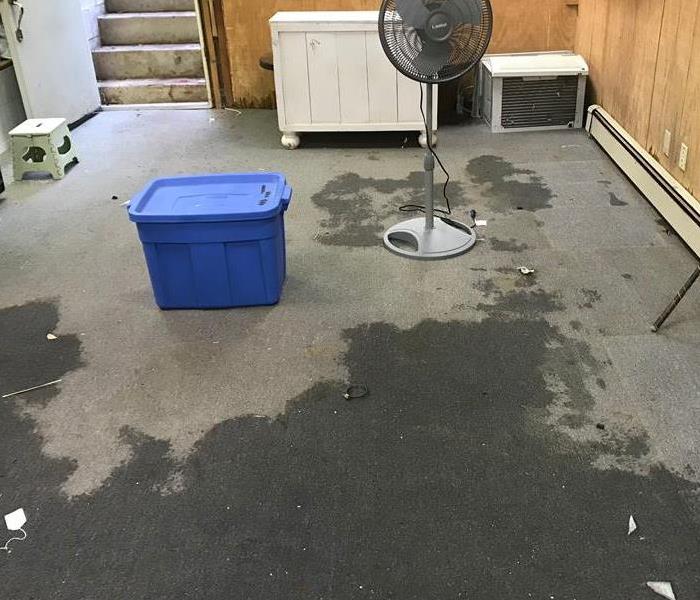How Can SERVPRO Clean Up and Restore A Flood-Damaged Home?
9/29/2020 (Permalink)
Our Skilled Professionals Employ Their Extensive Expertise and Time-Tested Procedures to Return Your Closter Residence to Its Pre-Flood Condition.
New Jersey is infamous for its rainy weather and the borough of Closter generally conforms to this statewide norm. Throughout the year, stormy weather is always a distinct possibility in the area. Strong coastal weather patterns routinely pass over our community, bringing with them powerful winds and heavy rains. The massive rainfalls these storms bring often swell the nearby Hudson River, as well as local streams and reservoirs, producing substantial flooding for local residential areas. When this happens, the floodwaters can rapidly inundate homes in the borough and surrounding areas. Worse still is the fact that these waters are usually filled with dangerous microbes and toxic wastes.
What Factors Determine the Severity of My Flood Damage?
SERVPRO relies on the classifications established by the Institute of Inspection, Cleaning and Restoration Certification (IICRC) to determine the severity of flood damage in Closter area homes. The organization holds that there are three categories of water, ranging from clean to severely polluted, and that floodwaters are among the most polluted types of water. These extremely damaging “black” waters generally contain such things as sewage and toxic chemicals. With all that said, the severity of your water damage is also affected by the amount of water materials absorbed. The IICRC categorizes absorption levels into the following four classes:
- Class 1: When contact between water and surfaces is minimal, impacted materials are not very porous, and the materials do not absorb much moisture. This situation allows technicians to complete their remediation efforts with little-to-no drying after removing the standing water.
- Class 2: This is when affected materials are more porous and come into contact with more water. When this is the case, more drying is required after water extraction to mitigate potential damage.
- Class 3: Significant volumes of water impact exceedingly porous materials, requiring extensive drying efforts to prevent substantial damage.
- Class 4: Represents the most difficult situation to remediate, when water saturates extremely porous materials and flows into hard-to-access areas. This class of damage, which can occur when flood water containing sewage saturates walls and floors, requires advanced specialized equipment and drying methods to clean up properly.
With all that said, in general, only structural elements can be saved when your home suffers flooding. Household contents coming into contact with the contaminated waters usually have to be disposed of.
How Does SERVPRO Handle the Most Severe Flood-Related Issues?
SERVPRO technicians are highly skilled in remediating even the most severe flood-related damage. When resolving class four water absorption situations, our experts:
- Rapidly extract large volumes of standing water with powerful extractors and submersible pumps
- Remove remaining water with wet vacs and mops
- Properly shovel up remaining hazardous debris and destroy contaminated contents according to Occupational Safety and Health Administration (OSHA) standards
- Aerate and dry the interior of your home with high-velocity box fans, air movers, and dehumidifiers
- Thoroughly dry flooring, walls, ceilings, and difficult-to-access areas behind structural elements with Injectidry systems and specialized drying mats
- Fog/inject Environmental Protection Agency (EPA)-approved antimicrobials and deodorants into impacted areas/materials with cutting edge foggers
After all of these efforts have been completed, your home is often saved from further flood-related damage and freed of the associated hazardous microbes and persistent unpleasant smells. In this way, SERVPRO returns your residence to its pre-flood condition.
What Can Happen If My Flood Damage Is Not Effectively Remediated?
Several exceedingly negative things can happen if your flood-related issues are not successfully cleaned up. These problems can persist for an extended period of time and cost you dearly over the long term. Some of the various effects of improperly remediated flood damage are:
- Structural elements, like walls and floors, could be ruined and require extensive reconstruction efforts
- Dry rot could weaken support beams and cause collapses
- Mold/mildew growths could damage and discolor surfaces
- Foul flood-associated odors could remain in your home indefinitely
- Flood Water-borne bacteria and fungi could cause health effects
As you can clearly see, it is in your best interest to find the best service to clean and restore your flood-impacted home. Contacting a quality service like SERVPRO is essential if you need to recover from the effects of a flood as soon as possible.
We are all attracted to the convenient suburban lifestyle of this fine community. In particular, residents appreciate its beautiful parks, relaxed lifestyle, and proximity to the city. All of these things make Closter an ideal place to live for those commuting to the nearby urban areas for work. Of course, nothing good ever comes without drawbacks. In our case, the difficulties we face as local homeowners are connected to stormy weather and the related flooding.
So, if flooding one day damages your home, remember that your neighbors at SERVPRO of Northeast Bergen County are always here to help. Whenever you need us, call (201) 244-0100.






 24/7 Emergency Service
24/7 Emergency Service
